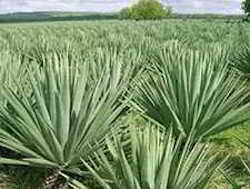A PhD student at the University of Liverpool is studying a plant that may be a viable feedstock to produce advanced biofuels. Agave sisalana is a proposed biofuel plant that can be grown in semi-arid conditions unsuited to food crops. The plant is already grown for fibre in countries like Brazil, Tanzania, Kenya and Madagascar. Sisal fibre has traditionally been used for marine ropes, bailer twine, and rugs, but today it is also finding new uses such as reinforced plastic composites for car door panels.
According to Bupphada, agave has a number of favorable characteristics for use as a fuel, as it contains large amounts of sugar and cellulose, and grows well in seasonally dry areas. As second generation biofuels technologies for converting cellulose to liquid transportation fuels are maturing fast, agave may prove to be a good feedstock.
 Supervised by plant biologist, Dr James Hartwell, Bupphada is investigating the genomic basis for agave’s ability to grow productively in dry regions.
Supervised by plant biologist, Dr James Hartwell, Bupphada is investigating the genomic basis for agave’s ability to grow productively in dry regions.
“Unlike most plants, agave opens the pores in its leaves and captures carbon dioxide during the cool, humid night,” said Hartwell. “It uses an adaptation of photosynthesis called Crassulacean acid metabolism (CAM), which means that it loses a lot less water during photosynthesis in comparison to major food crops like wheat or rice”.
In collaboration with Liverpool’s world-leading Centre for Genomic Research, Bupphada has sequenced RNA from agave leaves in order to gain a comprehensive understanding of the genes used for CAM photosynthesis. Long-term, the hope is that knowledge of which genes are important in agave will help accelerate its improvement as a biomass feedstock crop.
Bupphada came to Liverpool as a result of a partnership that the ARDA has with the University. After completing his PhD, he plants to return to Thailand to work at the Agricultural Ministry, applying his new findings on research projects there.
“Biofuels are a credible way of reducing our reliance on oil, but the areas in which they are grown requires careful planning,” said Bupphada. “Understanding how plants like agave grow in marginal areas means we can maintain food supply, while also creating alternative sources of income for communities.”

